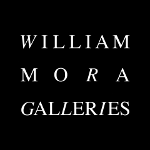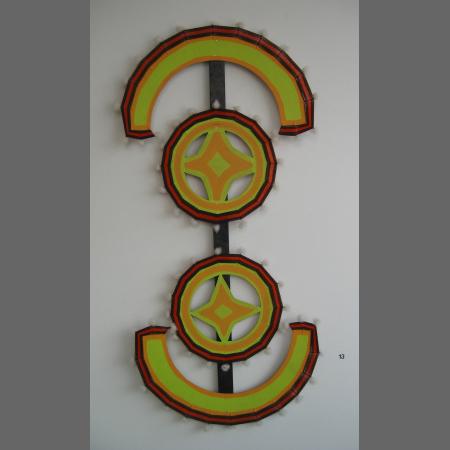Roy Wiggan - Recent Ilmas
2 - 26 March 2005
Starfish (1140)
acrylic on plywood, cotton wool, 56 x 117 cm
Oongoorloo (milky way) (2172)
2004, acrylic on plywood, cotton wool,84 x 41 cm
Ooloowa (water spout) (3198)
2005, acrylic on plywood, cotton wool, 91 x 70 cm
Diamond Fish (2324)
2004, acrylic on plywood, cotton wool,131 x 40 cm
Booloomangoorroo (2561)
acrylic on plywood, cotton wool,111 x 36 cm
Youla (2918)
2004, acrylic on plywood, cotton wool, 49 x 74 cm
Myara (2902)
acrylic on plywood, cotton wool, 123 x 68 cm
Starfish (2949)
2004, acrylic on plywood, cotton wool, 88 x 88 cm
Tide and Moon (2987)
2004, acrylic on plywood, cotton wool,190 x 79 cm
Tree (10000)
2004, acrylic on plywood, cotton wool,120 x 52 cm
Biyana (3142)
2004, acrylic on plywood, cotton wool,98 x 44 cm
Fish Trap (3214)
2005, acrylic on plywood, cotton wool,58 x 115 cm
Magabala (2322)
2004, acrylic on plywood, cotton wool, 109 x 52 cm
Roy Wiggan is a senior Bardi man born on Sunday Island in 1930, who now lives in Broome, and is the only member of his community entitled to make new Ilma. Ilma are rare hand-held objects used in corroboree dances and ceremonies, which enable Bardi people to access their dead ancestors and long history, and can also provide messages or communicate warnings to their users. The reverence in which these objects are held meant that traditionally they were not sold. Wiggan, as custodian of many sacred Bardi stories, has made the decision to sell his work, in the hope that the Ilma will be preserved for future generations through the Western art and museum system.
Ilma often depict physical things and natural phenomena - animals, tides, rain and country - but may also embody emotions or metaphysical concepts, such as the Bardi understanding of a doorway between the physical and spiritual worlds. Made with cotton wool, acrylic paint and plywood (in place of traditional materials such as hair, ochres, bark, feathers and native cotton), their distinctive appearance demonstrates the alternative visual language developed by Bardi people from their unique relationship with their country. Traditionally, Bardi life revolved around the sea, negotiating dangerous rips and whirlpools to travel around the Buccaneer Archipelago; an intimate knowledge of tidal patterns and marine life was essential for survival.

